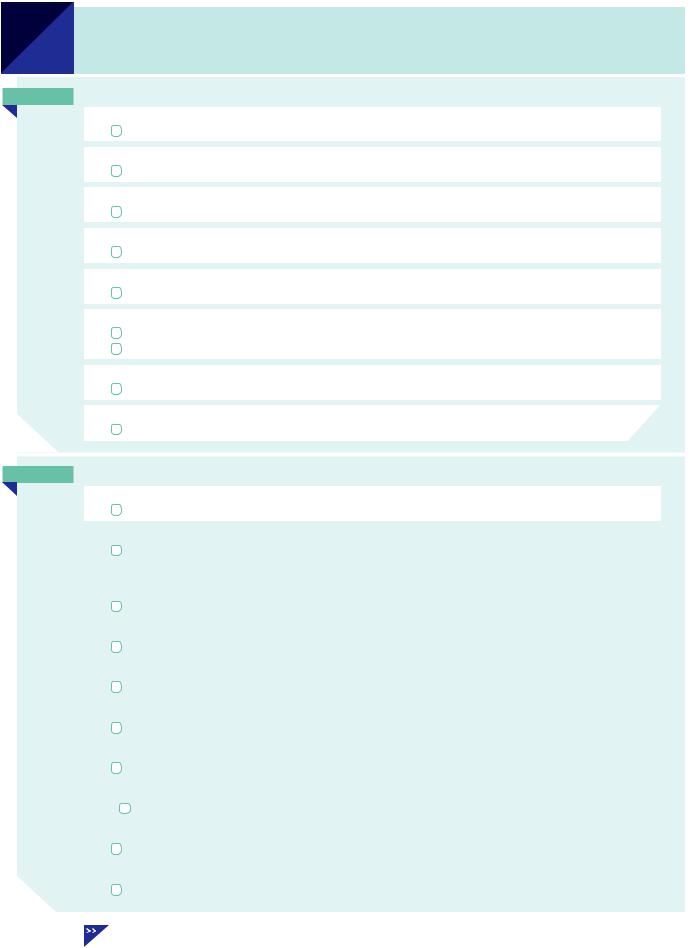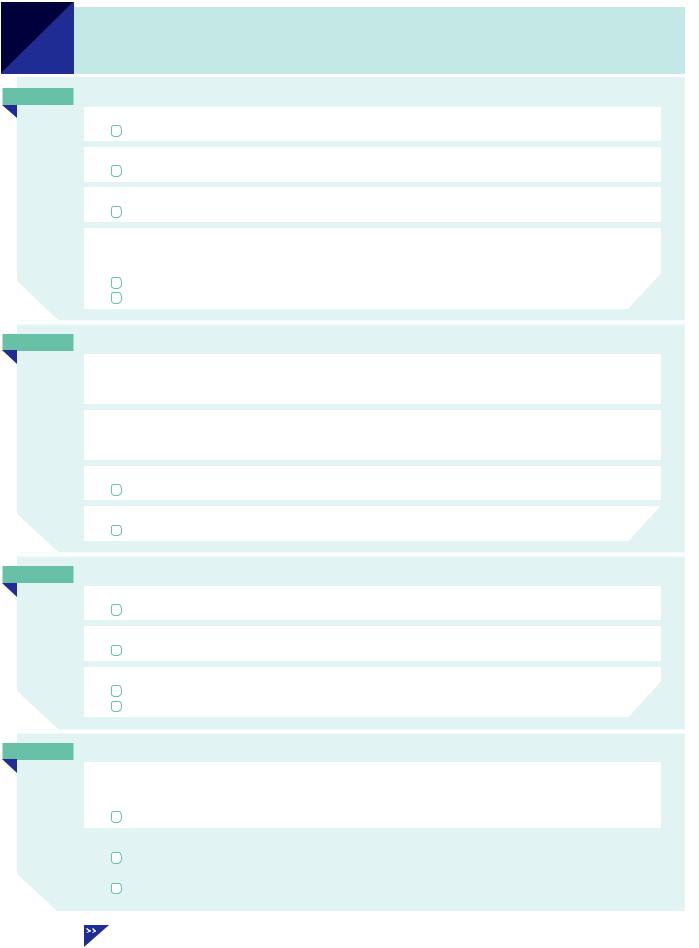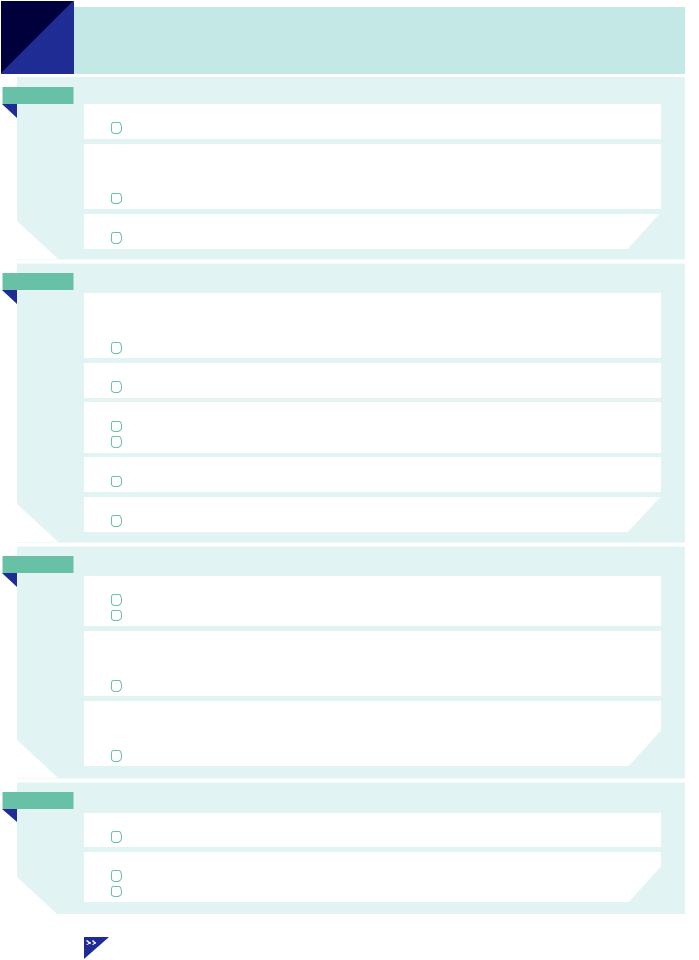
- •Contents
- •Thanks
- •To the student
- •To the teacher
- •3 Present continuous and present simple 1 (I am doing and I do)
- •10 Present perfect continuous and simple (I have been doing and I have done)
- •11 how long have you (been) … ?
- •12 for and since when … ? and how long … ?
- •13 Present perfect and past 1 (I have done and I did)
- •14 Present perfect and past 2 (I have done and I did)
- •15 Past perfect (I had done)
- •16 Past perfect continuous (I had been doing)
- •17 have and have got
- •18 used to (do)
- •19 Present tenses (I am doing / I do) for the future
- •20 I’m going to (do)
- •21 will and shall 1
- •22 will and shall 2
- •23 I will and I’m going to
- •24 will be doing and will have done
- •26 can, could and (be) able to
- •27 could (do) and could have (done)
- •28 must and can’t
- •29 may and might 1
- •30 may and might 2
- •31 have to and must
- •32 must mustn’t needn’t
- •33 should 1
- •34 should 2
- •35 I’d better … it’s time …
- •36 would
- •39 if I knew … I wish I knew …
- •40 if I had known … I wish I had known …
- •41 wish
- •42 Passive 1 (is done / was done)
- •43 Passive 2 (be done / been done / being done)
- •44 Passive 3
- •45 it is said that … he is said to … he is supposed to …
- •46 have something done
- •47 Reported speech 1 (he said that …)
- •48 Reported speech 2
- •49 Questions 1
- •52 Question tags (do you? isn’t it? etc.)
- •53 Verb + -ing (enjoy doing / stop doing etc.)
- •54 Verb + to … (decide to … / forget to … etc.)
- •55 Verb (+ object) + to … (I want you to …)
- •56 Verb + -ing or to … 1 (remember, regret etc.)
- •57 Verb + -ing or to … 2 (try, need, help)
- •58 Verb + -ing or to … 3 (like / would like etc.)
- •59 prefer and would rather
- •60 Preposition (in/for/about etc.) + -ing
- •61 be/get used to … (I’m used to …)
- •63 there’s no point in -ing, it’s worth -ing etc.
- •64 to … , for … and so that …
- •65 Adjective + to …
- •66 to … (afraid to do) and preposition + -ing (afraid of -ing)
- •67 see somebody do and see somebody doing
- •68 -ing clauses (He hurt his knee playing football.)
- •69 Countable and uncountable 1
- •70 Countable and uncountable 2
- •71 Countable nouns with a/an and some
- •74 the 2 (school / the school etc.)
- •75 the 3 (children / the children)
- •77 Names with and without the 1
- •78 Names with and without the 2
- •79 Singular and plural
- •80 Noun + noun (a bus driver / a headache)
- •81 -’s (your sister’s name) and of … (the name of the book)
- •82 myself/yourself/themselves etc.
- •83 a friend of mine my own house on my own / by myself
- •84 there … and it …
- •85 some and any
- •87 much, many, little, few, a lot, plenty
- •90 all every whole
- •91 each and every
- •92 Relative clauses 1: clauses with who/that/which
- •94 Relative clauses 3: whose/whom/where
- •95 Relative clauses 4: extra information clauses (1)
- •96 Relative clauses 5: extra information clauses (2)
- •97 -ing and -ed clauses (the woman talking to Tom, the boy injured in the accident)
- •98 Adjectives ending in -ing and -ed (boring/bored etc.)
- •99 Adjectives: a nice new house, you look tired
- •100 Adjectives and adverbs 1 (quick/quickly)
- •102 so and such
- •104 quite, pretty, rather and fairly
- •105 Comparative 1 (cheaper, more expensive etc.)
- •106 Comparative 2 (much better / any better etc.)
- •107 Comparative 3 (as … as / than)
- •108 Superlative (the longest / the most enjoyable etc.)
- •109 Word order 1: verb + object; place and time
- •110 Word order 2: adverbs with the verb
- •111 still any more yet already
- •112 even
- •114 in case
- •116 as (as I walked … / as I was … etc.)
- •117 like and as
- •119 during for while
- •121 at/on/in (time)
- •122 on time and in time at the end and in the end
- •123 in/at/on (position) 1
- •124 in/at/on (position) 2
- •125 in/at/on (position) 3
- •126 to, at, in and into
- •127 in/on/at (other uses)
- •129 Noun + preposition (reason for, cause of etc.)
- •130 Adjective + preposition 1
- •131 Adjective + preposition 2
- •132 Verb + preposition 1 to and at
- •134 Verb + preposition 3 about and of
- •135 Verb + preposition 4 of/for/from/on
- •136 Verb + preposition 5 in/into/with/to/on
- •137 Phrasal verbs 1 Introduction
- •138 Phrasal verbs 2 in/out
- •139 Phrasal verbs 3 out
- •142 Phrasal verbs 6 up/down
- •143 Phrasal verbs 7 up (1)
- •144 Phrasal verbs 8 up (2)
- •145 Phrasal verbs 9 away/back
- •Additional exercises
- •Study guide
- •Key to Exercises
- •Key to Additional exercises (see page 302)
- •Key to Study guide
- •Index

Unit
131 Adjective + preposition 2
Aadjective + of
afraid / scared / frightened / terrified OF …
‘Are you afraid of spiders?’ ‘Yes, I’m terrified of them.’
fond / proud / ashamed / jealous / envious OF …
Why is he so jealous of other people?
suspicious / critical / tolerant OF …
They didn’t trust me. They were suspicious of my motives.
aware / conscious OF …
‘Did you know he was married?’ ‘No, I wasn’t aware of that.’
capable / incapable OF …
I’m sure you are capable of doing the job well.
full / short OF …
Amy is a very active person. She’s always full of energy. I’m a bit short of money. Can you lend me some?
typical OF …
He’s late again. It’s typical of him to keep everybody waiting.
certain / sure OF or ABOUT …
I think she’s arriving this evening, but I’m not sure of that. or … not sure about that.
Badjective + at / to / from / in / on / with / for
good / bad / brilliant / better / hopeless etc. AT …
|
I’m not very good at repairing things. (not good in repairing things) |
||
|
|
|
|
|
married / engaged TO … |
|
|
|
Louise is married to an American. (not married with) |
||
|
but Louise is married with three children. (= she is married and has three children) |
||
|
|
|
|
|
|
|
|
|
similar TO … |
|
|
|
Your handwriting is similar to mine. |
|
|
|
|
|
|
|
|
|
|
|
diferent FROM or diferent TO … |
|
|
|
The film was diferent from what I’d expected. or |
… diferent to what I’d expected. |
|
|
|
|
|
|
|
|
|
|
interested IN … |
|
|
|
Are you interested in art? |
|
|
|
|
|
|
|
|
|
|
|
keen ON … |
|
|
|
We stayed at home. Chris wasn’t keen on going out. |
|
|
|
|
|
|
|
|
|
|
|
dependent ON … (but independent OF …) |
|
|
|
I don’t want to be dependent on anybody. |
|
|
|
|
|
|
|
|
|
|
|
crowded WITH (people etc.) |
|
|
|
The streets were crowded with tourists. (but … full of tourists) |
||
|
|
|
|
|
|
|
|
|
famous FOR … |
|
|
|
The Italian city of Florence is famous for its art treasures. |
||
|
|
|
|
|
|
|
|
|
responsible FOR … |
|
|
|
Who was responsible for all that noise last night? |
|
|
|
|
|
|
|
|
|
|
|
Preposition + -ing Unit 60 afraid of/to … Unit 66A |
Adjective + preposition 1 Unit 130 |
|
262 |
American English Appendix 7 |
|
|

Exercises |
Unit |
131 |
|
|
|
131.1 Complete the sentences using an adjective + of. Choose from:
|
ashamed |
aware |
capable |
envious |
proud |
scared |
short |
typical |
1 |
I’m a bit |
short of |
money. Can you lend me some? |
|
|
|
||
2 |
My children have done very well. I’m |
|
|
them. |
|
|||
3 |
What I did was very bad. I’m |
|
|
myself. |
|
|
||
4 |
She always behaves like that. It’s |
|
|
her. |
|
|
||
5 |
He wouldn’t be able to run his own business. He’s not |
|
|
it. |
||||
6 |
I don’t like going up ladders. I’m |
|
|
heights. |
|
|
||
7 |
Nobody told me she was ill. I wasn’t |
|
|
it. |
|
|
||
8 |
I wish I had what Sarah has. I’m |
|
|
her. |
|
|
||
131.2 Write sentences about yourself. Are you good at these things or not? You can use:
|
good |
pretty good |
not very good |
hopeless |
1 |
(repairing things) I’m |
not very good at |
repairing things. |
|
2 |
(telling jokes) |
|
|
|
3 |
(maths) |
|
|
|
4 (remembering names)
5 (making decisions)
131.3Complete the sentences using an adjective + preposition. Choose from:
|
afraid capable diferent |
interested |
proud |
responsible similar |
sure |
1 |
I think she’s arriving this evening, but I’m not |
sure of |
that. |
|
|
2 |
Your camera is |
mine, but it isn’t exactly the same. |
|
||
3 |
Don’t worry. I’ll look ater you. There’s nothing to be |
. |
|
||
4 |
I never watch the news on TV. I’m not |
|
the news. |
|
|
5 |
The editor is the person who is |
|
|
what appears in a newspaper. |
|
6 |
Sarah is a keen gardener and is very |
|
her garden. |
|
|
7 |
I was surprised when I first met Tina. She was |
|
what I expected. |
||
8 |
Ben could become world champion one day. He’s |
it. |
|
||
131.4 Complete the second sentence so that it means the same as the first.
1 |
There were lots of tourists in the streets. |
The streets were crowded with tourists |
. |
2 |
There was a lot of furniture in the room. |
The room was full |
. |
3 |
I don’t like sport very much. |
I’m not very keen |
. |
4 |
We don’t have enough time. |
We’re short |
. |
5 |
Helen does her job very well |
Helen is very good |
. |
6 |
Steven’s wife is a doctor. |
Steven is married |
. |
7 |
I don’t trust Robert. |
I’m suspicious |
. |
8 |
My problem is not the same as yours. |
My problem is diferent |
. |
131.5 Put in the correct preposition.
1 |
Amy is always full of |
energy. |
|
|
|
2 |
My home town is not a very interesting place. It’s not famous |
anything. |
|||
3 |
Kate is very fond |
her younger brother. |
|
||
4 |
You look bored. You don’t seem interested |
what I’m saying. |
|||
5 |
‘Our flight departs at 10.35.’ ‘Are you sure |
that?’ |
|
||
6 |
I wanted to go out for a meal, but nobody else was keen |
the idea. |
|||
7 |
These days everybody is aware |
the dangers of smoking. |
|
||
8 |
The station platform was crowded |
|
people waiting for the train. |
||
9 |
Mark has no money of his own. He’s completely dependent |
his parents. |
|||
10 |
We’re short |
staf in our ofice right now. We need more people to do the work. |
|||
Additional exercise 35 (page 322) |
263 |

Unit
132 Verb + preposition 1 to and at
Averb + to
talk / speak TO somebody (talk/speak with is also possible) Who were you talking to?
listen TO …
When I’m driving, I like to listen to the radio. (not listen the radio)
apologise TO somebody (for …)
They apologised to me for their mistake. (not apologised me)
explain something TO somebody
 Can you explain this word to me? (not explain me this word) explain / describe (to somebody) what/how/why …
Can you explain this word to me? (not explain me this word) explain / describe (to somebody) what/how/why …
I explained to them why I was worried. (not I explained them) Let me describe to you what I saw. (not Let me describe you)
Bphone somebody, ask somebody etc. (without to)
phone / call / email / text somebody
 I called the airline to cancel my flight. (not called to the airline) But we say ‘write (a letter) to somebody’.
I called the airline to cancel my flight. (not called to the airline) But we say ‘write (a letter) to somebody’.
answer somebody/something
 You didn’t answer my email. (not answer to my email) But we say reply to (an email / a letter etc.).
You didn’t answer my email. (not answer to my email) But we say reply to (an email / a letter etc.).
ask somebody (a question)
If there’s anything you want to know, you can ask me. (not ask to me)
thank somebody (for …)
He thanked me for helping him. (not He thanked to me)
Cverb + at
look / stare / glance AT …, have a look / take a look AT …
Why are you looking at me like that?
laugh AT …
I look stupid with this haircut. Everybody will laugh at me.
aim / point (something) AT …, shoot / fire (a gun) AT …
Don’t point that knife at me. It’s dangerous.
We saw someone with a gun shooting at birds, but he didn’t hit any.
DSome verbs can be followed by at or to, with a diference in meaning. For example:
shout AT somebody (when you are angry or aggressive)
 He got very angry and started shouting at me. shout TO somebody (so that they can hear you)
He got very angry and started shouting at me. shout TO somebody (so that they can hear you)
He shouted to me from the other side of the street.
|
throw something AT somebody/something (to hit them) |
|
|
Somebody threw an egg at the politician. |
|
|
throw something TO somebody (for somebody to catch) |
|
|
Lisa shouted ‘Catch!’ and threw the keys to me from the window. |
|
|
|
|
|
|
|
|
Verb + preposition 2–5 Units 133–136 ask for Unit 133B |
|
264 |
apologise for / thank somebody for Unit 135B Other verbs + to Unit 136D |
|

Exercises
132.1 Which is correct?
1a Can you explain this word to me? (a is correct) b Can you explain me this word?
2 |
a |
I got angry with Mark. Aterwards, I apologised to him. |
|
b I got angry with Mark. Aterwards, I apologised him. |
|
3 |
a |
Amy won’t be able to help you. There’s no point in asking to her. |
|
b Amy won’t be able to help you. There’s no point in asking her. |
|
4a I need somebody to explain me what I have to do. b I need somebody to explain to me what I have to do.
5 |
a |
They didn’t understand the system, so I explained it to them. |
|
b They didn’t understand the system, so I explained it them. |
|
6 |
a |
I like to sit on the beach and listen to the sound of the sea. |
|
b I like to sit on the beach and listen the sound of the sea. |
|
7a I asked them to describe me exactly what happened. b I asked them to describe to me exactly what happened.
8 a We’d better phone the restaurant to reserve a table. b We’d better phone to the restaurant to reserve a table.
9a It was a dificult question. I couldn’t answer to it. b It was a dificult question. I couldn’t answer it.
10a I explained everybody the reasons for my decision. b I explained to everybody the reasons for my decision.
11a I thanked everybody for all the help they had given me. b I thanked to everybody for all the help they had given me.
12a My friend texted to me to let me know she was going to be late. b My friend texted me to let me know she was going to be late.
132.2Complete the sentences. Use these verbs + the correct preposition:
|
|
explain |
laugh |
listen look point |
reply speak throw throw |
||
1 |
I look stupid with this haircut. Everybody will |
laugh at |
me. |
||||
2 |
I don’t understand this. Can you |
explain it to me? |
|
||||
3 |
We live in the same building, but we’ve never |
|
one another. |
||||
4 |
Be careful with those scissors! Don’t |
them |
me! |
||||
5 |
You shouldn’t |
directly |
the sun. You’ll damage your eyes. |
||||
6 |
Please |
|
|
me! I’ve got something important to tell you. |
|||
7 |
Don’t |
|
stones |
the birds! |
|
||
8 |
If you don’t want that sandwich, |
|
it |
the birds. They’ll eat it. |
|||
9 |
I tried to contact Tina, but she didn’t |
|
my emails. |
||||
|
|
|
|
|
|||
132.3 |
Put in to or at. |
|
|
|
|
||
1 |
They apologised |
to me for what happened. |
|
||||
2 |
I glanced |
|
my watch to see what time it was. |
|
|||
3 |
Please don’t shout |
me! Try to calm down. |
|
||||
4 |
I saw Lisa and shouted |
her, but she didn’t hear me. |
|||||
5 |
Don’t listen |
|
what he says. He doesn’t know what he’s talking about. |
||||
6 |
What’s so funny? What are you laughing |
? |
|
||||
7 |
Is it all right if I have a look |
your magazine? |
|
||||
8 |
I’m lonely. I need somebody to talk |
. |
|
||||
9 |
She was so angry she threw a book |
the wall. |
|
||||
10 |
The woman sitting opposite me on the train kept staring |
me. |
|||||
11 |
Do you have a moment? I need to speak |
you. |
|
||||
Unit
132
Additional exercise 36 (page 323) |
265 |

Unit
133 Verb + preposition 2 about/for/of/ater
Averb + about
talk / read / know ABOUT …
We talked about a lot of things at the meeting.
have a discussion ABOUT something
 We had a discussion about what we should do. But we say ‘discuss something’ (no preposition):
We had a discussion about what we should do. But we say ‘discuss something’ (no preposition):
We discussed what we should do. (not discussed about)
do something/nothing ABOUT something = do something/nothing to improve a situation
If you’re worried about the problem, you should do something about it.
Bverb + for
ask (somebody) FOR …
 I sent an email to the company asking them for more information about the job. But we say ‘ask somebody the way / the time’ etc. (no preposition):
I sent an email to the company asking them for more information about the job. But we say ‘ask somebody the way / the time’ etc. (no preposition):
I asked somebody the way to the station.
apply (TO a company etc.) FOR a job etc.
I think you could do this job. Why don’t you apply for it?
wait FOR somebody, wait FOR something (to happen)
Don’t wait for me. I’ll join you later.
I’m not going out yet. I’m waiting for the rain to stop.
search (a person / a place / a bag etc.) FOR …
I’ve searched the house for my keys, but I still can’t find them.
leave (a place) FOR another place
I haven’t seen her since she let (home) for work. (not let to work)
Ctake care of, care for and care about
take care OF … = look ater, keep safe, take responsibility for
Don’t worry about me. I can take care of myself.
I’ll take care of the travel arrangements. You don’t need to do anything.
care FOR somebody = take care of them, keep them safe
 Alan is 85 and lives alone. He needs somebody to care for him. I don’t care FOR something = I don’t like it
Alan is 85 and lives alone. He needs somebody to care for him. I don’t care FOR something = I don’t like it
I don’t care for hot weather. (= I don’t like …)
care ABOUT … = think that somebody/something is important
 He’s very selfish. He doesn’t care about other people. care what/where/how … etc. (without about)
He’s very selfish. He doesn’t care about other people. care what/where/how … etc. (without about)
You can do what you like. I don’t care what you do.
Dlook for and look ater
look FOR … = search for, try to find
I’ve lost my keys. Can you help me to look for them?
look AFTER … = take care of, keep safe or in good condition
Alan is 85 and lives alone. He needs somebody to look ater him. (not look for) You can borrow this book, but please look ater it.
266 |
Verbs + about/of (think/hear etc.) Unit 134 Other verbs + for Unit 135B |

Exercises
133.1Which is right?
1 We searched everywhere Joe / searched everywhere for Joe, but we couldn’t find him.
(searched everywhere for Joe is correct)
2 I sent her an email. Now I’m waiting for her to reply / waiting her to reply.
3 A security guard searched my bag / searched for my bag as I entered the building. 4 I paid the taxi driver and asked him a receipt / asked him for a receipt.
5 I wanted to get to the city centre, so I stopped a man to ask the way / to ask for the way. 6 We discussed about the problem / discussed the problem, but we didn’t reach a decision.
7 There are many problems, but the government does nothing for them / nothing about them.
8 My flight is at 9.30. What time do I need to leave the hotel to the airport / for the airport?
133.2Put in the correct preposition. If no preposition is necessary, leave the space empty.
1 |
I’m not going out yet. I’m waiting |
for the rain to stop. |
|
|
|
2 |
I’ve applied |
three universities. I hope one of them accepts me. |
|
||
3 |
If you don’t want the job, there’s no point in applying |
it. |
|
||
4 |
I don’t want to talk |
what happened last night. Let’s forget it. |
|
||
5 |
I don’t want to discuss |
|
what happened last night. Let’s forget it. |
|
|
6 |
We had an interesting discussion |
the problem, but we didn’t reach a decision. |
|||
7 |
My friends are in Italy. They’re in Rome now and tomorrow they leave |
Milan. |
|||
8 |
The roof of the house is in bad condition. We need to do something |
it. |
|||
133.3 Put in the correct preposition ater care. If no preposition is necessary, leave the space empty.
1 |
He’s very selfish. He doesn’t care about other people. |
||
2 |
Who’s going to take care |
you when you are old? |
|
3 |
She doesn’t care |
the exam. She doesn’t care whether she passes or fails. |
|
4 |
I don’t like this coat very much. I don’t care |
the colour. |
|
5 |
Don’t worry about the shopping. I’ll take care |
that. |
|
6 |
He gave up his job to care |
his elderly father. |
|
7 |
I want to have a good holiday. I don’t care |
the cost. |
|
8 |
I want to have a good holiday. I don’t care |
how much it costs. |
|
133.4Complete the sentences with look for or look ater. Use the correct form of look (looks/ looked/looking).
1 |
I looked for |
my keys, but I couldn’t find them anywhere. |
|
2 |
Kate is |
a job. I hope she finds one soon. |
|
3 |
Who |
you when you were ill? |
|
4 |
The car park was full, so we had to |
somewhere else to park. |
|
5 |
A child minder is somebody who |
other people’s children. |
|
6 |
I’m |
Lisa. I need to ask her something. Have you seen her? |
|
133.5 Complete the sentences with these verbs (in the correct form) + a preposition:
|
apply |
ask |
do |
leave |
look |
search |
talk |
wait |
|
1 |
Police are |
searching for a man who escaped from prison. |
|
|
|||||
2 |
Sarah wasn’t ready. We had to |
|
|
her. |
|
|
|||
3 |
I think Amy likes her job, but she doesn’t |
|
|
it much. |
|
||||
4 |
Don’t |
|
|
me |
money. I don’t have any. |
|
|
||
5 |
Ben is unemployed. He has |
|
|
several jobs, but hasn’t had any luck. |
|||||
6 |
If something is wrong, why don’t you |
|
|
something |
it? |
|
|||
7 |
Helen’s car is very old, but she |
|
|
it. It’s in excellent condition. |
|
||||
8 |
Diane is from Boston, but now she lives in Paris. She |
|
Boston |
Paris |
|||||
|
when she was 19. |
|
|
|
|
|
|
|
|
Unit
133
Additional exercise 36 (page 323) |
267 |
